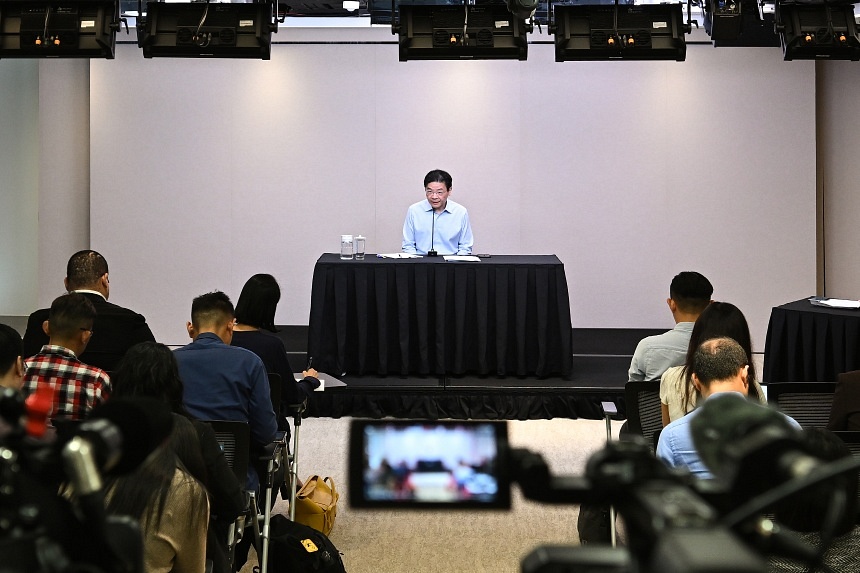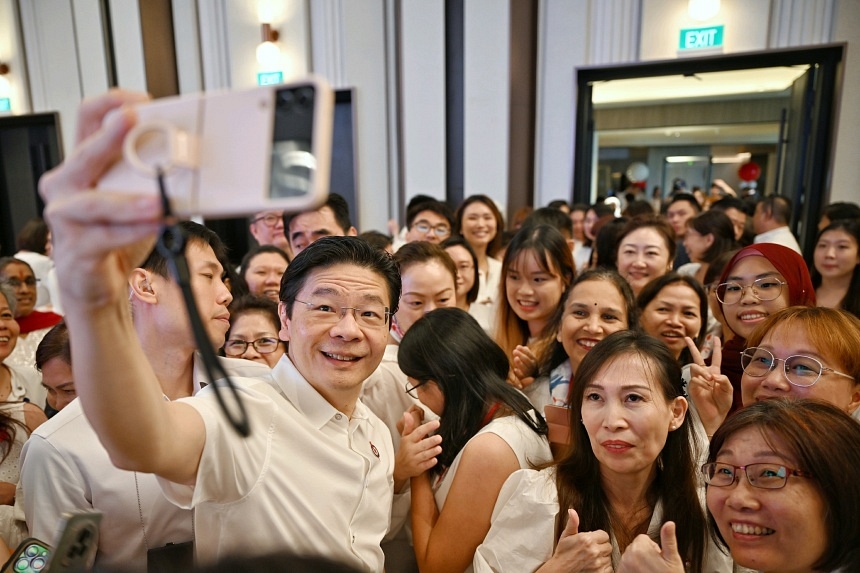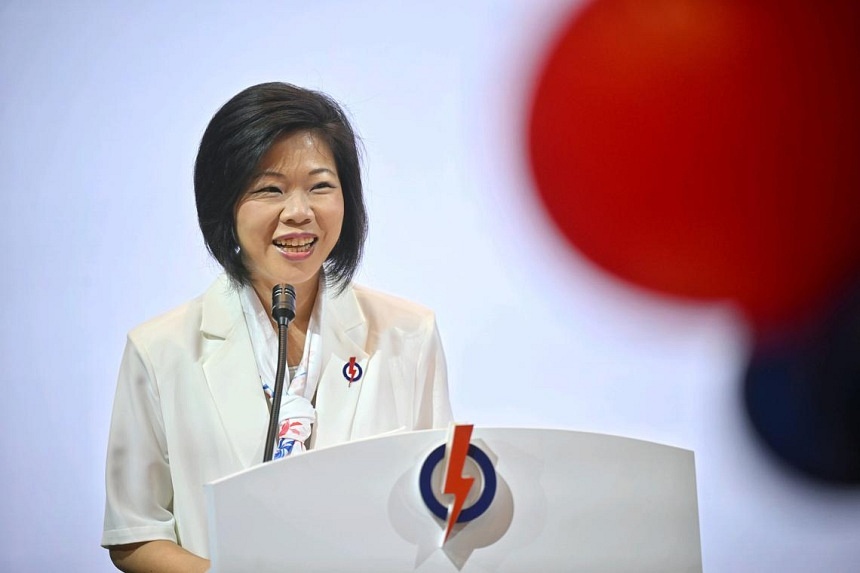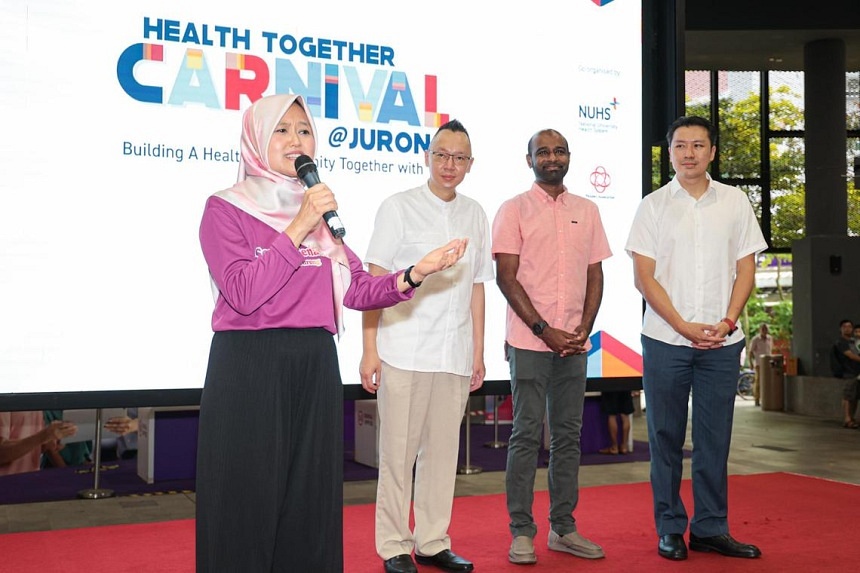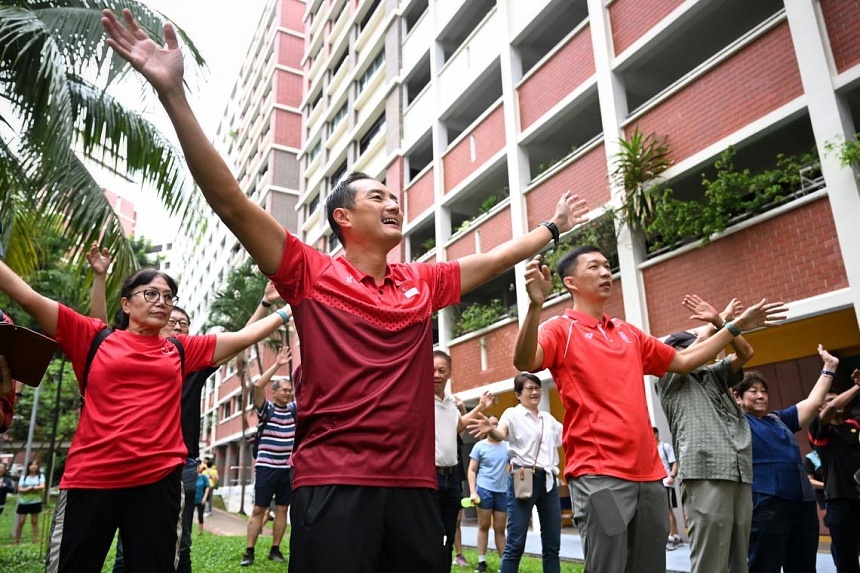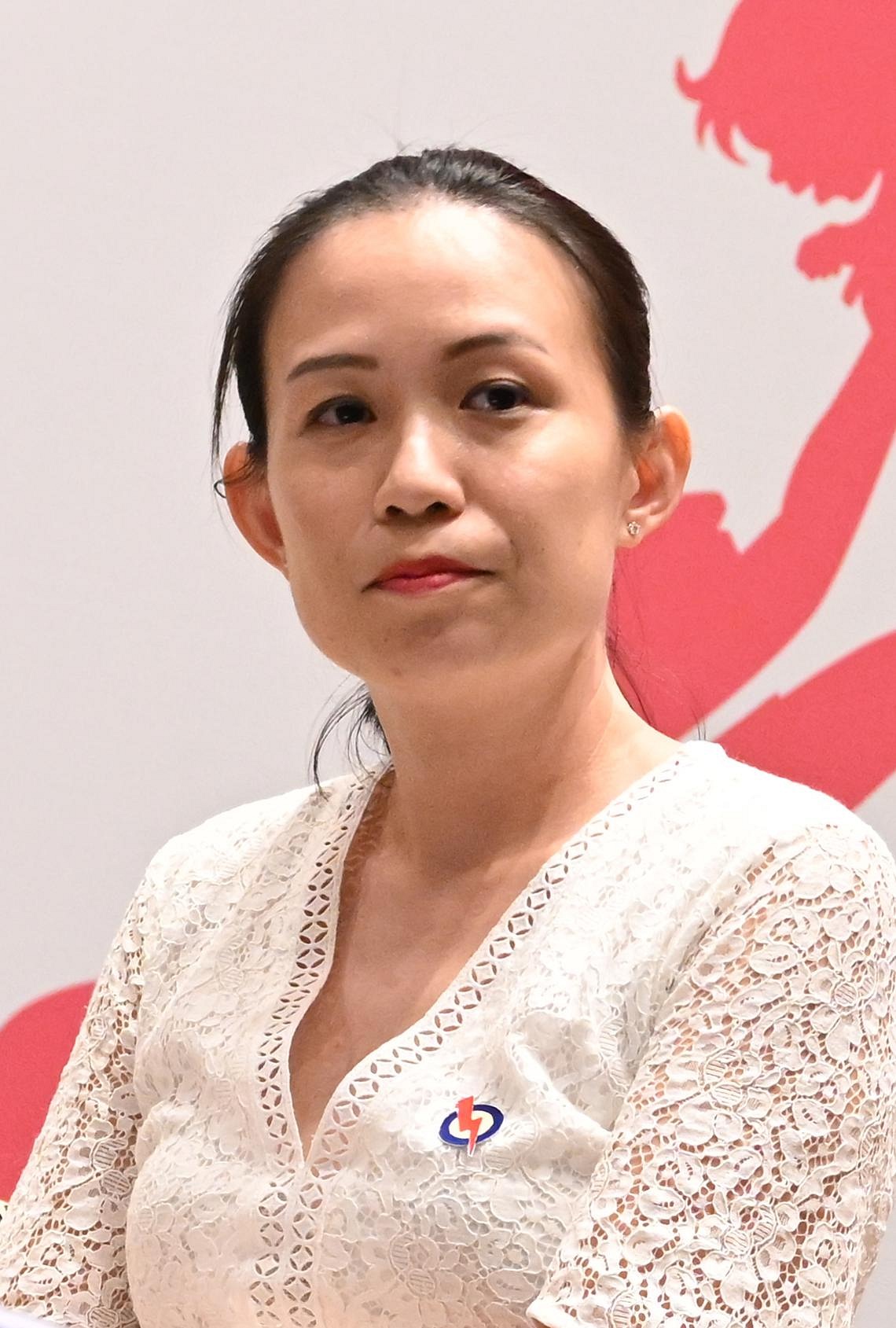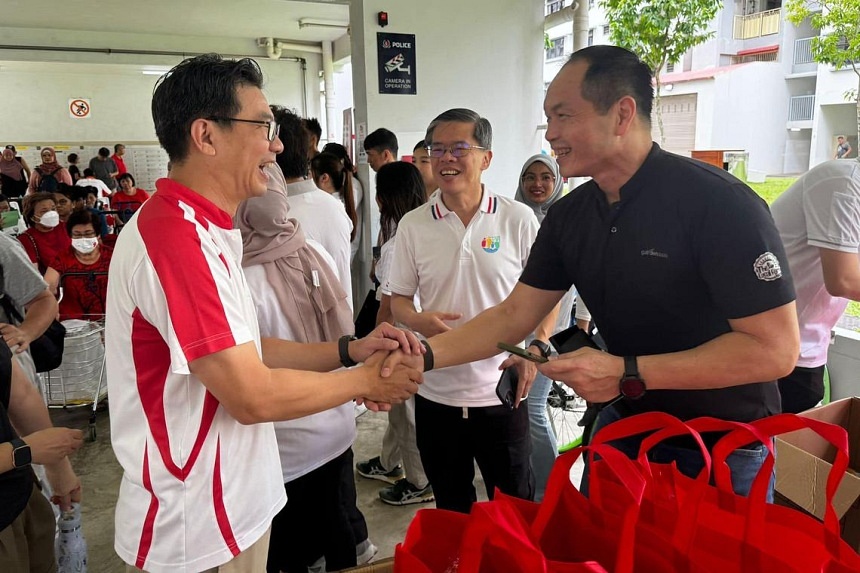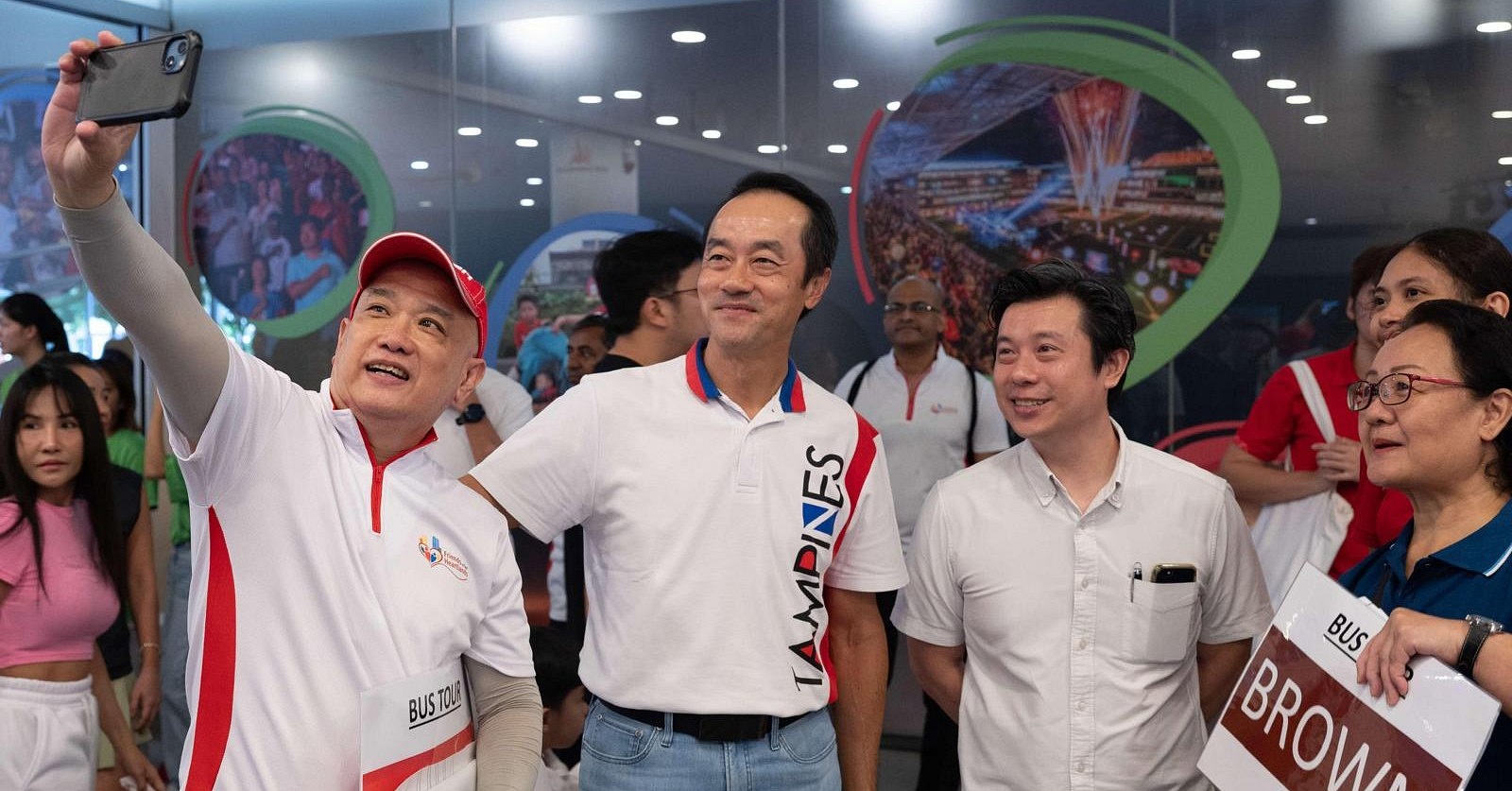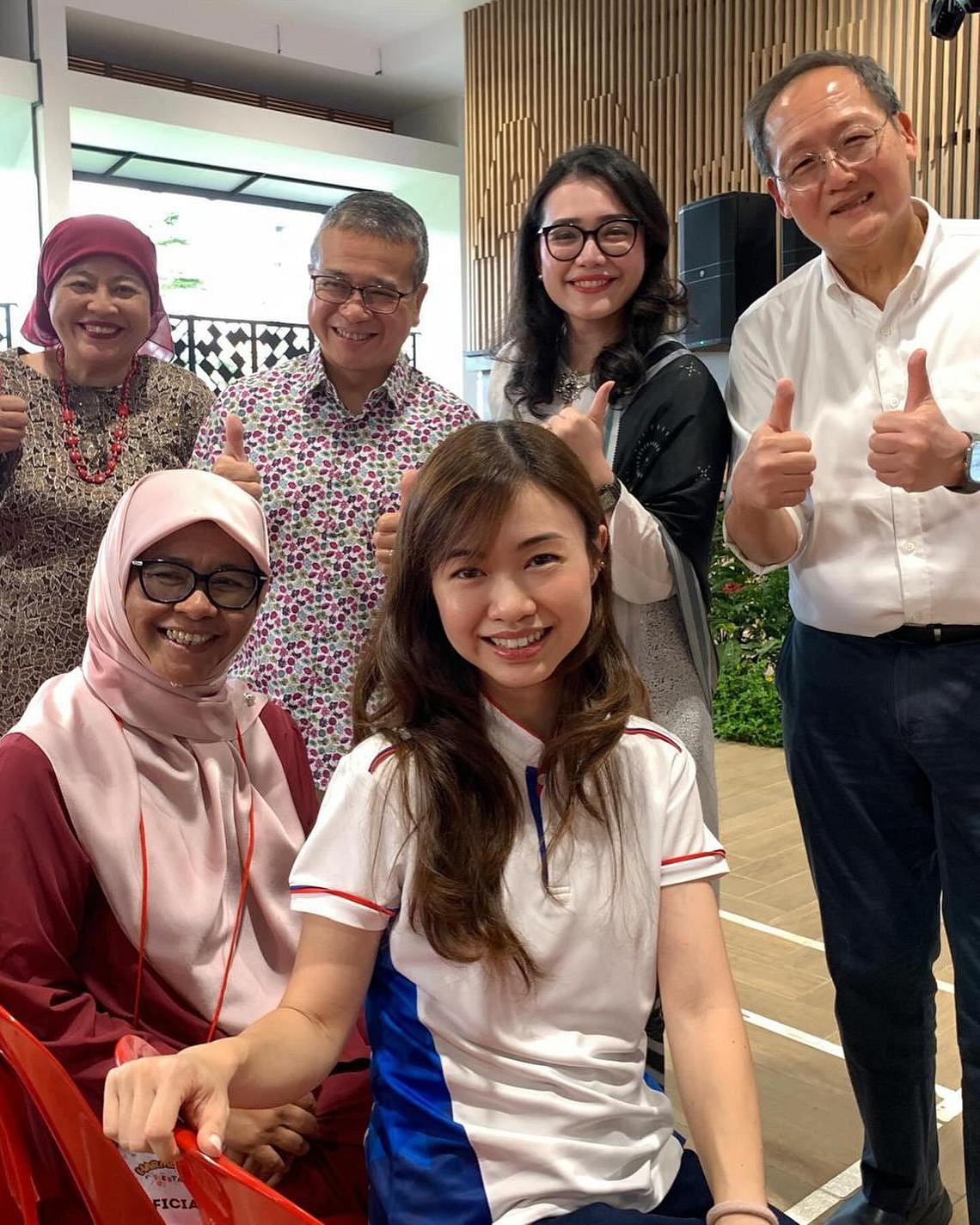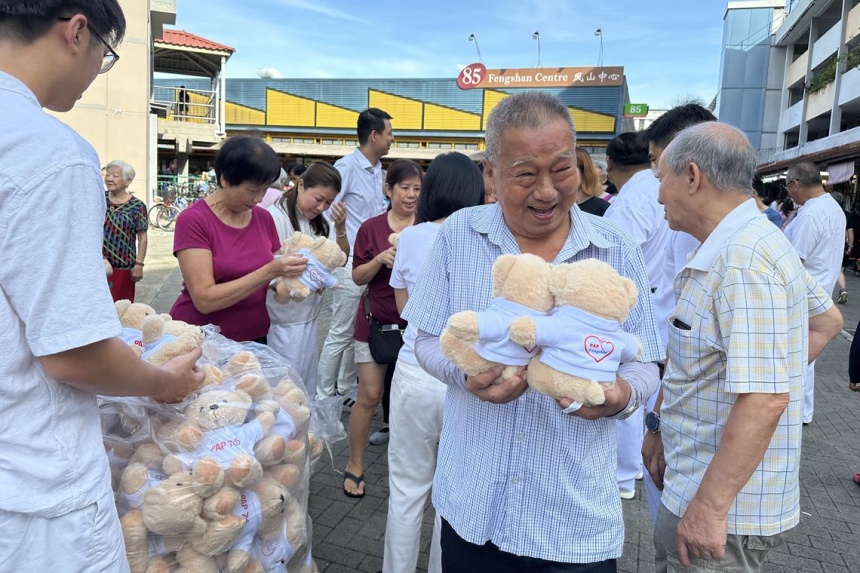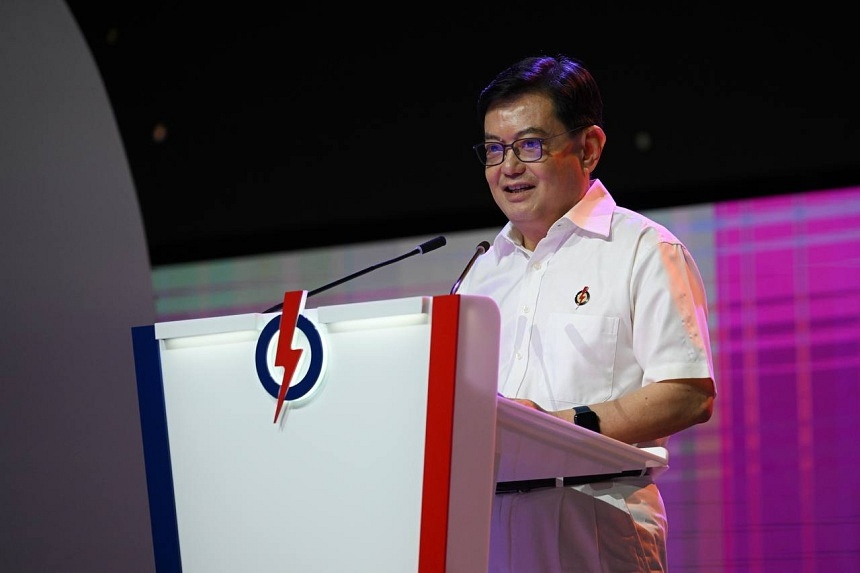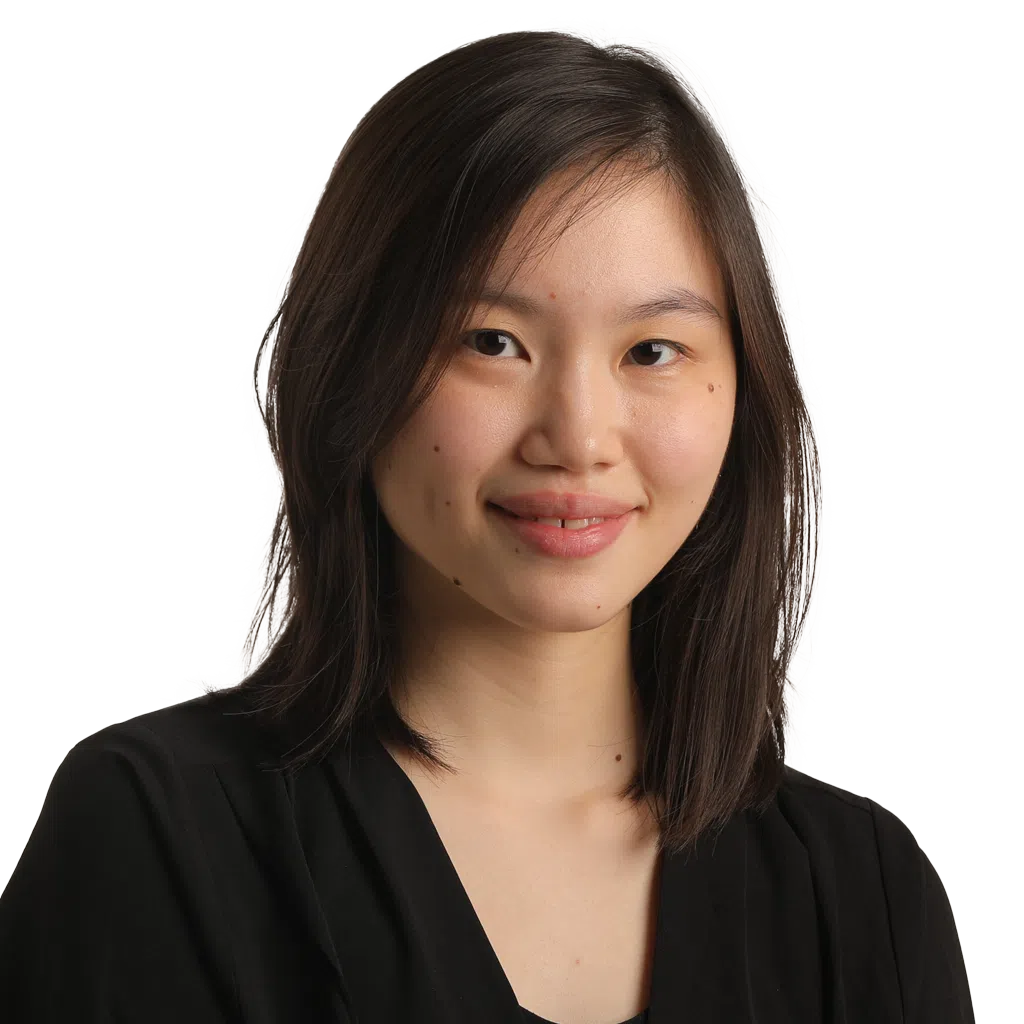New faces emerge across constituencies ahead of the next GE: Who are they so far?
Two new faces, Dr Charlene Chen (left) and Dr Choo Pei Ling, have featured on banners with elected MPs in Tampines and Marine Parade GRCs. PHOTOS: ST FILE, LIANHE ZAOBAO
Ng Wei Kai and
Goh Yan Han
Nov 09, 2024
SINGAPORE – In Tampines and Marine Parade GRCs, two new faces have featured on banners with elected MPs.
Dr Charlene Chen and Dr Choo Pei Ling are grassroots advisers in the two constituencies respectively.
The academics are among at least seven new faces in the PAP camp who have in the last 1½ years assumed leadership roles in opposition wards and almost every PAP-held constituency with empty seats.
All have been spotted alongside MPs at community events and made party branch chairs or grassroots advisers – roles sometimes held by those later fielded as candidates for the ruling party.
Only one spot, in West Coast GRC, remains publicly unspoken for. This is former transport minister S. Iswaran’s seat, vacant since
he resigned in January 2024 following a corruption probe.
Analysts say getting new faces on the ground early could give the People’s Action Party (PAP) an edge in contested and opposition-held areas. For one thing, residents will have more time to get familiar with potential candidates, whose early start can signal a commitment by the party to winning over the voters.
Refreshing the slate
In constituencies held by the Workers’ Party (WP) – Hougang, Sengkang and Aljunied – the PAP has brought in new blood.
Two new faces
joined the Aljunied GRC line-up in August. Trade unionist Jagathishwaran Rajo now chairs the Eunos branch, while Paya Lebar’s new branch chairman is Mr Kenny Sim, the chief executive of an IT products firm.
Mr Marcus Loh, a director at a digital transformation services firm, also
joined the PAP’s refreshed Sengkang GRC slate in November 2023. His team comprises former minister of state Lam Pin Min, as well as relative newcomers Elmie Nekmat and Theodora Lai. Both
came on board in March 2022 after the last general election (GE).
Mr Loh’s move took place a week after trade unionist Jackson Lam was appointed Hougang branch chairman.
Up-and-comers have also been seen in Jurong, Marine Parade and Tampines GRCs, which have one vacant seat each. President Tharman Shanmugaratnam
stepped down in Jurong to run for president in July 2023, while Speaker of Parliament Tan Chuan-Jin and Ms Cheng Li Hui – from Marine Parade and Tampines respectively –
resigned after an affair between them came to light that year.
Their respective replacements are: orthopaedic surgeon Hamid Razak; Dr Choo, an assistant professor at the Singapore Institute of Technology’s health and social sciences cluster; and Dr Chen, an assistant professor of marketing at NTU.
Dr Hamid Razak (second from right) with (from left) Jurong GRC MPs Rahayu Mahzam, Tan Wu Meng and Shawn Tan at the NUHS Health Together carnival on Oct 12. PHOTO: LIANHE ZAOBAO
All three are active on the ground, and some, like Dr Choo, have got the public backing of party stalwarts.
In April, Emeritus Senior Minister Goh Chok Tong – who was active in Marine Parade for over 40 years –
lauded Dr Choo as the “present and future” of the estate.
(From left) Dr Choo Pei Ling, Emeritus Senior Minister Goh Chok Tong and Manpower Minister Tan See Leng at Marine Parade’s 50th anniversary event in April. ST PHOTO: LIM YAOHUI
Two months later, Dr Chen was
introduced to Tampines residents by the GRC’s anchor minister Masagos Zulkifli. Mr Masagos, who is Minister for Social and Family Development, said she would be working with him to serve Tampines East – the ward vacated by Ms Cheng.
Dr Charlene Chen, a grassroots adviser in Tampines GRC, speaking to an attendee at the OTH Festival held at Our Tampines Hub on June 15. ST PHOTO: GAVIN FOO
All three are second grassroots advisers (2GA).
While the majority of grassroots volunteers do not stand for political office, some sitting MPs such as Tampines GRC’s Desmond Choo and Nee Soon GRC’s Carrie Tan had held the 2GA post before they stood for election.
The newly minted appointees told The Straits Times they have been working to connect with specific demographics.
For Mr Jackson Lam, this means Hougang’s seniors and young people.
“We are working closely with the active ageing centres in Hougang. We want to reach out to as many seniors as possible, and promote healthy active living,” he said.
“At the same time, we actively reach out to the youth at rental blocks, such as during the festive seasons.”
Senior Minister of State for National Development Tan Kiat How (foreground, left) and Hougang grassroots organisations adviser Jackson Lam doing warm-up exercises with residents of Hougang Central in June. ST PHOTO: CHONG JUN LIANG
Associate Professor Elmie, a communications expert from NUS, said Sengkang’s Malay community has been particularly welcoming and open to sharing their thoughts on issues.
“(These) include international ones such as the wars and conflicts in the Middle East, as well as local issues like the lack of halal eateries in the neighbourhood,” he said.
Prof Elmie said his team is planning more programmes and assistance for residents.
“Admittedly, there are limits to what I can do as a non-elected representative of the PAP in Sengkang,” he added.
“While I cannot write to agencies to appeal for help on behalf of residents, I will try to better understand their problems and offer help within what I can.”
Associate Professor Elmie Nekmat at the official opening of Buangkok Community Club in July. ST PHOTO: LIM YAOHUI
Good to be seen early
Publicly introducing potential candidates early may lead to more support at the ballot box, said political observers.
For one thing, they have more time to engage residents, and the party has a longer runway to gauge sentiments in the lead-up to the polls.
SMU law don Eugene Tan said the PAP may want to give new faces time to know the ground better.
It would also want to avoid “parachuting in” new candidates at opposition-held constituencies late, given the amount of legwork needed to wrestle these back, he added.
Early introductions can also help suss out sentiments on the ground, said independent political observer Felix Tan.
He said: “If there are any shifts, there will still be time for the PAP to make changes to the candidates when the time for an election comes.”
NUS’ Associate Professor Chong Ja Ian said that this strategy ensures there are fewer surprises, as was the case with Mr Ivan Lim in GE2020.
Mr Lim had been formally introduced as part of the Jurong GRC team, but
withdrew after online criticism of his conduct emerged.
An early start may also serve as a signal of political intent to defend vulnerable constituencies and win back lost ones.
Former PAP MP Inderjit Singh, who retired from politics in 2015, said the early introduction of teams in opposition-held constituencies “shows PAP’s seriousness about serving the constituency and to win back the seats”.
There is usually less pressure to do so in constituencies where the PAP is the incumbent, as other MPs in the constituency can stand in for those who have stepped down at Meet-the-People sessions and community events, SMU’s Professor Tan noted.
But in the case of Marine Parade and Tampines, the PAP may face competition from the WP – the second-largest party in Parliament with 10 seats won at GE2020 – he noted.
During GE2020, the PAP
won Marine Parade with 57.74 per cent of the vote to the WP’s 42.26 per cent. It was one of the slimmer margins of victory for the ruling party.
The PAP fared better in Tampines against the National Solidarity Party, where it
got 66.41 per cent of the vote compared with the opposition’s 33.59 per cent. However, the WP has been carrying out walkabouts in the constituency, signalling a possible contest there as the party continues to expand in the east of Singapore.
Finally, introducing potential candidates early may help them stand out among the ruling party’s large slate. The PAP typically contests every elected seat in Parliament and refreshes about a third of its slate every general election.
In a large slate, it is easy for individual candidates to get lost in the crowd, Prof Chong said.
One downside of going public so early, though, is that potential candidates may become fodder for public and online debates.
“Social media has always been unforgiving and toxic, and with these new faces or replacements coming to the fore, there will be more vitriol one might expect to see online,” Dr Felix Tan said.
What about West Coast?
West Coast GRC stands out. Unlike other constituencies, there is no clarity on who will fill the vacant seat left by former Cabinet minister Iswaran.
One possibility is entrepreneur Chua Wei-Shan, who is the Young PAP’s organising secretary. Ms Chua was acting branch chairwoman in Iswaran’s absence and has also been seen on the ground with MPs.
But she does not fulfil the GRC’s ethnic minority requirement, necessitating a reshuffle if she is fielded there.
Entrepreneur Chua Wei-Shan has been seen on the ground with MPs. PHOTO: ST FILE
West Coast saw the closest fight in GE2020, where the PAP line-up, anchored by Iswaran and National Development Minister Desmond Lee,
won with just 51.68 per cent of the vote.
The Progress Singapore Party, led in its first hustings by former PAP MP Tan Cheng Bock, garnered 48.32 per cent of the vote.
“The razor-thin victory margin means this GRC is vulnerable electorally for the PAP and the circumstances under which the GRC has one fewer PAP MP there does not help matters,” said Prof Tan, referring to Iswaran’s criminal charges and subsequent jail sentence.
Prof Tan said the question for the party is whether it should deploy another heavyweight – such as a minister or popular backbencher – or a “new face” to replace Iswaran.
An overly hasty announcement could tie its hands unnecessarily, he added.
Another factor could be the fate of the constituency itself.
Dr Felix Tan noted that it is possible the GRC could be carved up to become a smaller one by the Electoral Boundaries Review Committee, with sections spliced out into SMCs or joining other GRCs.
Mr Singh has previously said changes in electoral boundaries in the west may be on the cards, due to a jump in voter numbers in Hong Kah North – which had a 65.33 per cent increase in voters between 2020 and 2024.
This may result in shifts in the boundaries of Jurong GRC and West Coast GRC.
WP’s guessing game
Across the aisle, the WP has not publicly introduced potential successors for its two empty seats in Parliament – Ms Raeesah Khan’s seat in Sengkang and Mr Leon Perera’s in Aljunied.
Ms Khan
resigned in November 2021 after admitting she lied in Parliament, while Mr Perera
resigned in July 2023 after an affair between him and former WP East Coast candidate Nicole Seah came to light.
The WP seems to also be weighing its options for Sengkang and Aljunied GRCs, and may not want to give its opponent time to scrutinise its replacements, said Prof Tan.
This adds to the WP’s “guessing game” with the ruling party. It is very likely that the replacements would be among its strongest candidates, which the party may not want to reveal yet, he added.
Dr Tan noted that WP cadres and potential new candidates face much greater public scrutiny than those from the PAP.
“There are probably some who are already considered for those seats, but the WP could be waiting for a more opportune time to reveal,” he said.
Mr Singh added: “From their perspective, they will want to have an element of surprise so that the PAP will not have enough time to prepare a strategy to counter the particular candidate that will finally be sent.”
Also seen on the ground
Apart from those who have been formally appointed to their various positions, there are others who have also been spotted on the ground.
Leaders from the civil service, the private sector and non-profits have been seen with PAP MPs at political party walkabouts and community events.
Possibly the most senior former civil servant to appear alongside PAP MPs so far is Singapore Business Federation chief executive officer Kok Ping Soon.
Mr Kok, who was until 2023 the chief executive of the Government Technology Agency, has been pictured with Nee Soon MP Derrick Goh since September, attending various events including North West Service Week, a quarterly assistance programme for those living in public rental flats.
Nee Soon MP Derrick Goh (left) and Singapore Business Federation CEO Kok Ping Soon (centre) at North West Service Week in September. PHOTO: DERRICK GOH/FACEBOOK
The 53-year-old has been chairman of Nee Soon Link Citizens Consultative Committee – a grassroots outfit – since June 2024.
Mr Kok has also sat on the boards of various agencies and institutes, including the Infocomm Media Development Authority and the Defence Science and Technology Agency.
He started his career at the Economic Development Board, and also held positions such as deputy secretary at the Ministry of Manpower.
From the private sector, shipping lawyer Gho Sze Kee, 45, has been seen alongside Mountbatten MP Lim Biow Chuan in photos since August.
She has accompanied Mr Lim to numerous events such as National Day celebrations with Thye Hua Kwan Active Ageing Centre and the Mountbatten Active Ageing Committee. She also attended a Deepavali light-up event in Jalan Batu with him in October.
Ms Gho is a long-term party volunteer who was among the speakers at the 2021 PAP party convention, where the then Bukit Timah branch secretary called for the inclusion of diverse voices across its ranks.
It is unclear if she is still in that role, but checks show she was still active in the area in the past year, as she received a Public Service Medal in 2023 as vice-chairwoman of the Bukit Timah Citizens Consultative Committee.
She is currently associate director at AsiaLegal, a boutique law firm that specialises in maritime law.
Mr Gabriel Lam, chief operating officer of Shalom Movers, was spotted at a Housing Board roadshow for Tampines GreenCrest residents with Senior Minister of State for Manpower and Sustainability and the Environment Koh Poh Koon in September.
Senior Minister of State for Manpower and Sustainability and the Environment Koh Poh Koon (second from left) and Mr Gabriel Lam (second from right) at an HDB roadshow for Tampines GreenCrest residents in September. PHOTO: KOH POH KOON/INSTAGRAM
Mr Lam, who is in his early 40s, was previously involved in Chong Pang grassroots work, taking on roles such as vice-chairman of the ward’s National Day dinner in 2023.
His LinkedIn biography says he is “passionate about giving back to society and to help the less fortunate”, and that he “dedicates his free time to community-related volunteerism and is a grassroots leader”.
Also seen in Bishan-Toa Payoh GRC and Aljunied GRC is Dr Adrian Ang, a director at Chye Thiam Maintenance, a facility and environmental management company.
The 41-year-old was photographed with Bishan-Toa Payoh GRC MPs during a market visit in April.
In a Lianhe Zaobao report that month, Mr Saktiandi Supaat said Dr Ang was a grassroots leader in Toa Payoh West, which Transport Minister Chee Hong Tat looks after.
Dr Ang, who was formerly a lecturer and section head at Temasek Polytechnic, is the secretary of the Toa Payoh West-Thomson Citizens Consultative Committee and branch secretary.
He was also in August appointed to the Bishan-Toa Payoh Town Council’s tender and contracts committee as vice-chairman.
More recently, Dr Ang was pictured alongside Mr Victor Lye – who has contested Aljunied GRC since 2015 – at home visits in late October. Some pictures, posted by Mr Lye on social media, show Dr Ang wearing a shirt with the PAP logo and the word “Aljunied” below it.
Dr Adrian Ang (second from right) during a home visit in October. PHOTO: VICTOR LYE/FACEBOOK
Also in the mix is Mr David Hoe, who is principal business architect at energy company YTL PowerSeraya.
Mr Hoe, 36, has been pictured alongside Jalan Besar GRC MP Denise Phua at various walkabouts, at times donning a PAP badge on his shirt as at one Pek Kio Market visit in June.
He has also been a district councillor for Central Singapore Community Development Council since 2019, according to his LinkedIn profile. Ms Phua is the mayor for the Central Singapore district.
Jalan Besar GRC MP Denise Phua and Mr David Hoe during a Pek Kio Market visit in June. PHOTO: DENISE PHUA/FACEBOOK
Mr Hoe scored poorly for his Primary School Leaving Examination, but worked his way to university and became a Ministry of Education scholarship holder and teacher.
His educational journey has made headlines in the past.
One potential face from the non-profit sector is Madam Hazlina Abdul Halim, chief executive officer of Make-A-Wish Singapore.
The 39-year-old was pictured in photos with Marine Parade GRC MPs at the Harmony Fiesta in Marine Parade in September, as well in posts by MacPherson MP Tin Pei Ling.
Madam Hazlina Abdul Halim (standing, second from right) at the Harmony Fiesta in Marine Parade with Manpower Minister Tan See Leng (standing, right), Minister for Culture, Community and Youth Edwin Tong (standing, second from left) and MacPherson MP Tin Pei Ling (front, centre). PHOTO: TIN PEI LING/INSTAGRAM
Madam Hazlina, who started her career as a journalist at Mediacorp, was formerly the president of PPIS (Singapore Muslim Women’s Association) from 2020 to 2024, and is currently also a director of Mendaki, among other roles.
The Straits Times has reached out to all of them for comments.
From the opposition, Mr Perera, 54, the former Aljunied GRC MP, has been spotted at Progress Singapore Party (PSP) events, and is volunteering with them.
He had resigned from the WP after his affair with Ms Seah, the party youth chair, came to light in July 2023.
He is not currently a member of the party, a PSP spokesperson said in mid-October.






